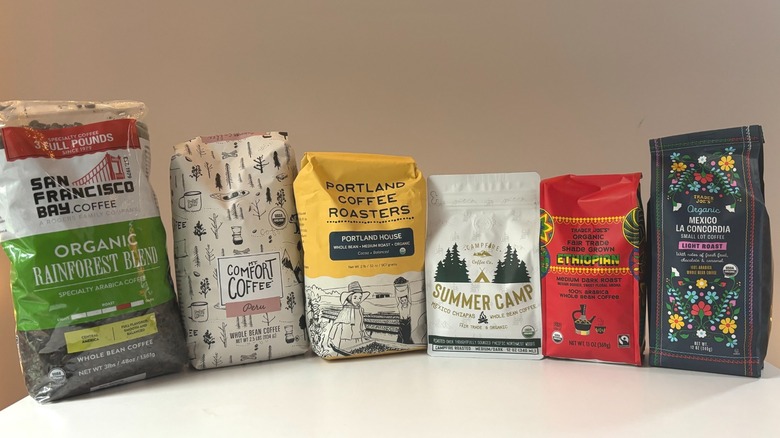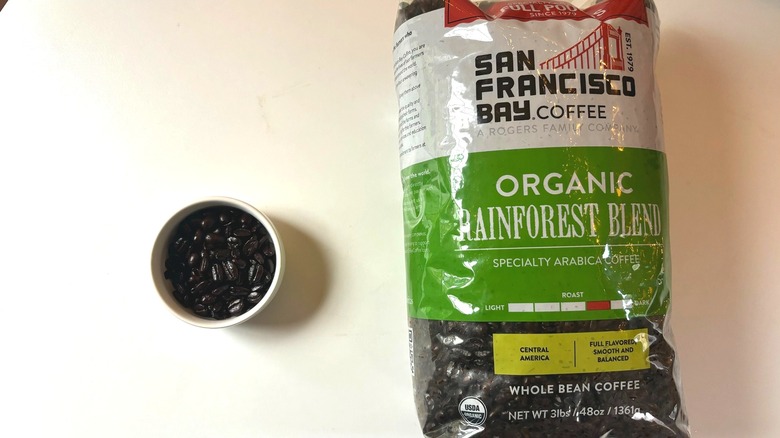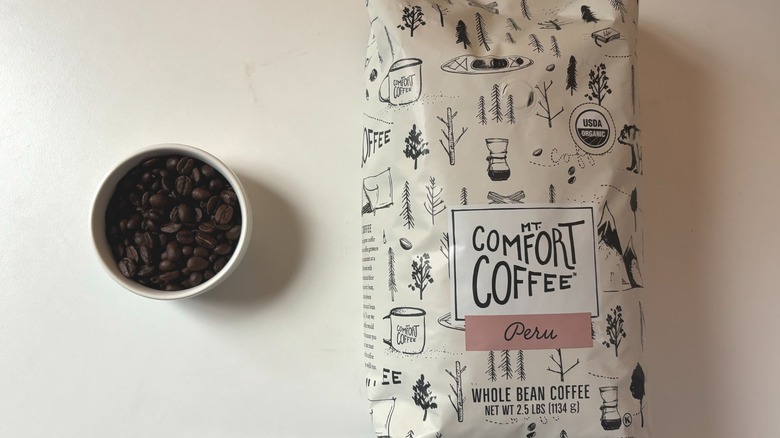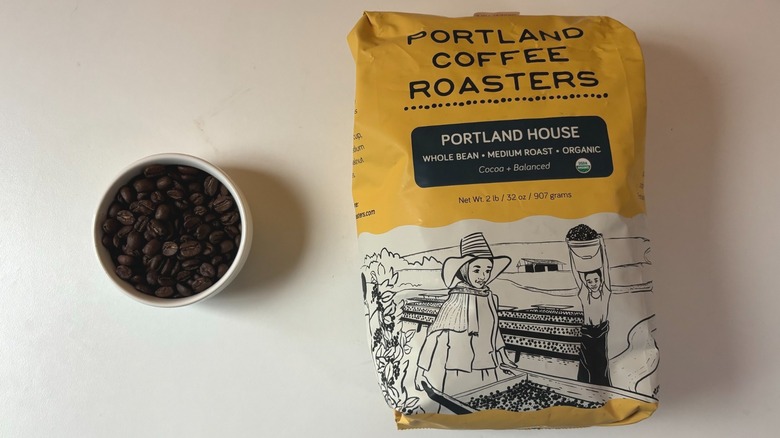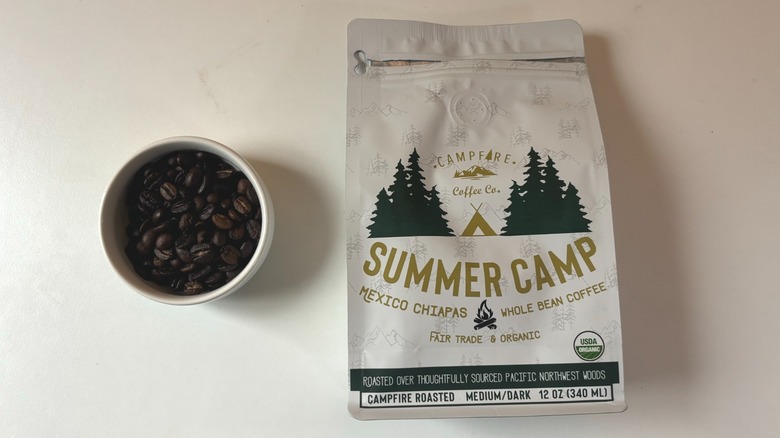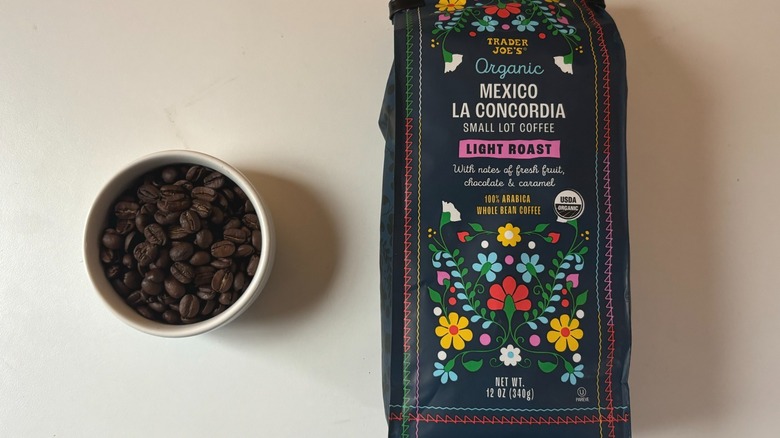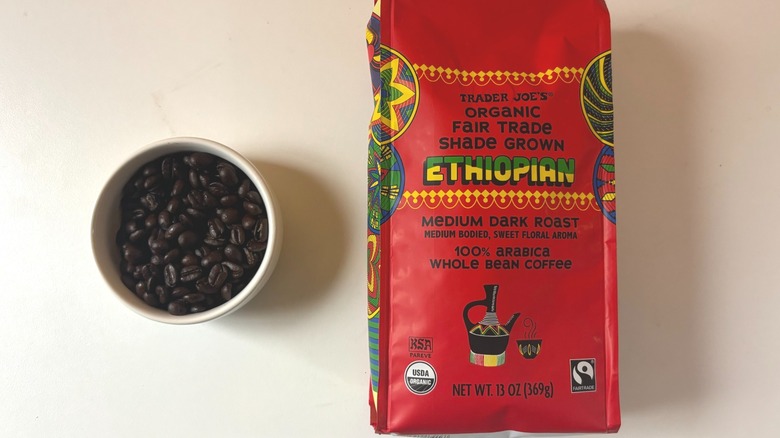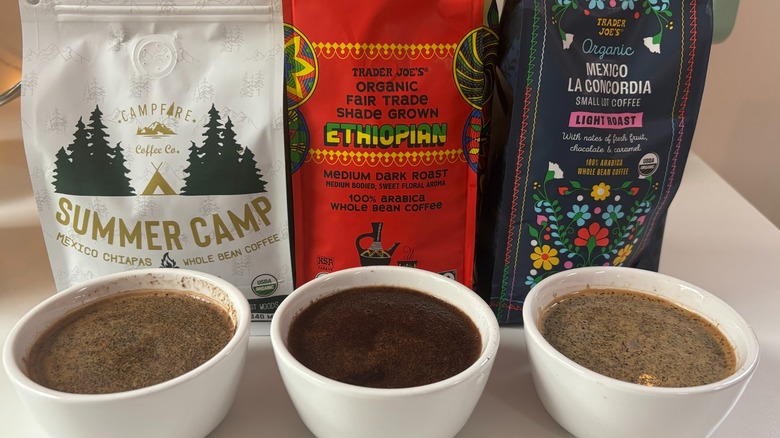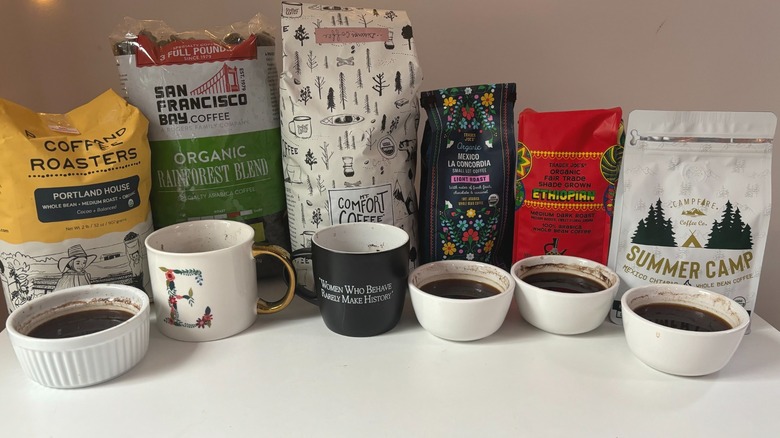Costco Vs Trader Joe's: Which Store Has The Better Whole-Bean Coffee?
There's nothing I love more than a steaming hot cup of black coffee to start off my mornings. As a longtime barista, I'm pretty picky about my morning cuppa and always on the hunt for my next favorite cup. Though local, small roasters will always hold a special place in my heart, there's a certain comfort to knowing I could be on vacation and pop into a grocery store to buy a bag of coffee I know and love. To that end, because I'm an avid shopper at Costco and Trader Joe's, I thought it would be fun to try coffees from each and compare so I know where to go the next time I run out on a road trip.
Since I've already tried and ranked Costco's Kirkland whole bean coffees, I opted to get brands I've never had from the superstore. When picking which coffees to get from either store, I stuck with a medium roast (except Trader Joe's' Mexican La Concordia) to establish a baseline of comparison for each coffee. I did a cupping for all the coffees, which allowed me to get a good sense of their flavor profiles and tasting notes. One of these retailers definitely did come out on top — though I'll admit, it was a rather close call.
Costco: San Francisco Bay Organic Rainforest Blend
Costco carries a few different blends from San Francisco Bay Coffee. I chose to try their Rainforest Blend as I was curious to see how much flavor would come through in a medium-dark roast of Central American coffee. I was immediately skeptical upon opening the bag, though; I could instantly tell the beans had a shiny, oily sheen, a classic sign the bean had been over-roasted. Nevertheless, I decided to give it a fair shot and set my preconceptions to the side: maybe San Francisco Bay would surprise me.
Alas, it was not to be. Though I wouldn't call San Francisco Bay's Rainforest Blend the worst coffee you could buy at Costco, it would sit squarely at the bottom of my list if I were ranking the coffees I tried for this article. It was incredibly smoky and I don't think I'd ever be able to drink a cup of this black, though I'd choke it down if it was my only option. It could be made marginally better with cream and flavoring, but I prefer not to bog my coffee down with such accessories. While it definitely was "full flavored" as the bag states, the flavor was mostly just ashy, and I didn't get any identifiable tasting notes. Usually I can at least taste hints of chocolate, caramel, or dark cherry (which are all characteristic of the makeup of most coffees) I got none of them here; just smoke and ash.
Costco: Mt. Comfort Coffee Peru
I must admit, one reason I was drawn to Costco's Mt. Comfort Coffee offering was because of the adorable packaging, which evokes an image of brewing coffee around a campfire in the middle of a forest — not a bad way to spend a morning. Gorgeous exterior aside, I was excited to try this Peruvian coffee as, admittedly, I don't indulge in Peruvian beans very often. Peruvian coffees typically have a light, mild flavor, and I generally go for the tangy, fruit-forward profile present in many African coffees. Nevertheless, I was happy upon opening this bag to see a medium-roast bean that wasn't oily at all.
Unfortunately, I was slightly underwhelmed by this coffee. I simply wanted more flavor. I liked how it sat on the sides of my mouth with a mild, zesty acidity, but as far as tasting notes go, I only got dark cherry and a hint of sweet caramel. It was smooth enough to easily be drinkable black, but I struggled to find anything noteworthy. This is a good coffee to start with if you want to begin trying regional beans without getting too deep into wacky flavor profiles. I'd also reckon it's balanced enough to make a decent beginner cold brew coffee; in fact, drinking it as a cold brew may be beneficial in helping some of its sweeter, fruity notes come through.
Costco: Portland Coffee Roasters House Blend
I should mention that I'm not entirely new to Portland Coffee Roasters — I've been to my local shop a few times to grab a quick cup of drip coffee, and admittedly, I was never very impressed. However, I was interested to see what would happen if I had control over brewing a cup from Portland Coffee Roasters. That's why I decided to give this bag from Costco a try today. These beans were actually slightly lighter in color than Mt. Comfort's Peru coffee, which surprised me; I was expecting a slightly darker roast from the company's standard house blend.
I'd give Portland Coffee Roasters' House Blend a solid middle ranking. If I had to pick a coffee on this list to be presented as just coffee — a solid cup, nothing fancy — it would be this one. It goes down quite smoothly and is pretty universally palatable. You could easily drink it black or with cream or customize it to your liking. It's like the vanilla cake of coffees: a good base to let the accoutrements shine. Though there weren't any stand-out tasting notes, I did get hints of cocoa as indicated on the bag. I didn't love this coffee, but I appreciated it for what it had to offer: a universally enjoyable cup of coffee that would serve as a great palette for some coffee creativity.
Trader Joe's: Campfire Coffee Co. Summer Camp
Again, the bag drew me in on this one, but what can I say — summer camp nostalgia can hook even the best of us. What made me snatch the bag from the shelf, though, was the fact that its beans are roasted over a campfire. Yes, a literal campfire. I figured it was only fair of me to give this Trader Joe's offering a shot, if for no other reason than to see how good the company is at vetting the coffee that it carries. I was nervous upon opening the bag, because though the beans weren't oily, they did look darker than I prefer. There was some slight color variegation throughout the beans that can be signs of an inconsistent roast.
My fears were assuaged when I sipped some of these Mexican beans. Surprisingly, its "campfire" quality came through quite well in a good way — whereas with San Francisco Bay's Rainforest Blend, I only tasted smoke and ash, this coffee had a subtle smokiness somewhat reminiscent of the smell of a centuries-old meat roasting cellar. Despite being darker than I prefer, I'd be happy to drink it black; the smokiness balanced out well with a dark cherry/caramel sweetness, lending itself to an incredibly smooth cup. It was even a little brighter than expected, but I wouldn't call it anything unique. I'd say this is a fairly universally palatable coffee with the distinct "campfire" quality coming through beautifully.
Trader Joe's: Trader Joe's Mexico La Concordia
Is Trader Joe's' Mexico La Concordia coffee really a light roast? I'll leave that up to you to decide if you grab a bag. At best, it's on the darker side of a light roast, verging on the edge of medium. However, I didn't let my initial opinion of the beans hamper my tasting of this coffee, and I'm glad I put my preconceptions aside. In fact, after trying this coffee and Campfire Coffee Co.'s Mexican beans, I think I'll be more on the lookout for single-origin Mexican coffees in the future rather than just sticking to coffees from my favorite African countries.
The first word that came to mind when I sipped this cup was "delightful." While it didn't "wow" me, it was pleasant to drink. It was smooth, and I enjoyed how it lingered on the top of my mouth, much like chocolate would after sucking on a chocolate bar. Speaking of chocolate, this coffee's chocolate notes came through beautifully, and I even got some fruity notes, though not as much as I would have liked. It was very palatable and tasted deep and rich without being bitter. I'd recommend this to anyone who wants to dip their toes into drinking black coffee due to the ease with which it goes down. I also think this would make a great batch of fruity, light roast cold brew coffee.
Trader Joe's: Trader Joe's Shade Grown Ethiopian
Of course, I had to try Trader Joe's' Ethiopian coffee. Ethiopia is one of my favorite coffee-origin countries; I love the bright, zesty fruitiness characteristic of the beans, and I enjoy the juicy tang you tend to get in each sip. I was looking forward to trying this one, though I told myself to temper my expectations: after all, I typically opt for a light roast Ethiopian bean, these are medium-dark. Nevertheless, I decided to give them a try and see what a darker roast Ethiopian bean had to offer.
While I still think this would have benefited from being roasted slightly less, I didn't mind the depth these darker beans presented. I don't know if I could call it one of Trader Joe's' best coffee varieties, but it certainly is one of the most unique I've tried. It's very sharp, acidic, and floral, with a light sweetness and hint of fruit at the end of the sip, and it still gave me that zing I love in Ethiopian coffees. I can understand why it wasn't roasted lighter, as that could have led to a super sharp, juicy cup that I may have liked more but probably wouldn't be as palatable to the average consumer. This may not be everyone's favorite, but if you're interested in expanding your palate and seeing what African coffee beans have to offer, I recommend giving this one a try.
Which store offers better whole-bean coffee, Costco or Trader Joe's?
Overall, none of these coffees left me wondering why I'd never bought a bag before, and none left me wondering why it had been made in the first place (maybe except the Rainforest Blend). However, Trader Joe's carries the better coffee, simply because Trader Joe's beans do a decent job at showcasing coffee's uniqueness. You don't have to know everything about coffee to appreciate the subtle nuances present in a cup, and Trader Joe's beans absolutely lend themselves to that experience. Whether a casual consumer or a coffee connoisseur, you could find something to suit your taste buds at Trader Joe's.
However, don't discount Costco's offerings, as they could also be palatable depending on your needs. If you need a big bag of universally enjoyable coffee to offer a crowd or you want to play around with, say, adding fall spices to your coffee, you may find Costco's mid-range offerings suit your needs better. If you want to start dipping your toes into the world of coffee by trying different origin countries and varietals, though, Trader Joe's is absolutely the better choice.
Methodology
When comparing these coffees, I did a cupping, where you brew a small, fairly concentrated cup of coffee to get a full sense of its flavor profile. I gave each coffee at least a few sips to make sure I was judging it fairly, and I also account for the quality of the beans — did they look dry or oily? Was there any color variation among the beans? Mostly, though, I needed to enjoy sipping the coffee black, and I needed to get some tasting notes other than just coffee for a store to win this competition.
I needed to feel the character of each coffee coming through when I tasted it. Whereas the Rainforest Blend just gave notes of ashy, burnt coffee, the Summer Camp coffee, which also tasted smoky, used the smokiness to its advantage by allowing other tasting notes (a smooth, rich cherry) to come through. Blends and single origins were both fair game; though single origins tend to have more easily identifiable tasting notes, I chose not to prefer that over a cup that was equally smooth and palatable, like Portland Coffee Roaster's Portland House coffee. Had I chosen a coffee other than the Rainforest Blend, Costco may have had more of a shot against Trader Joe's.
